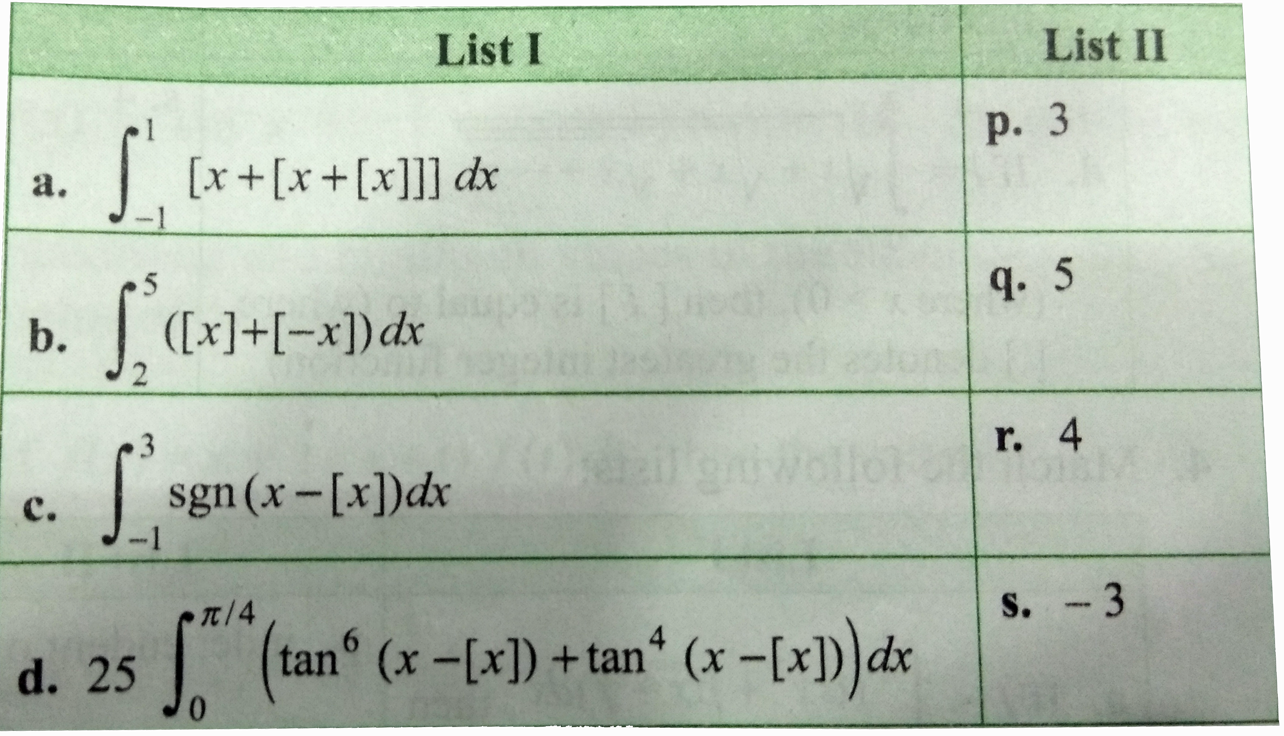LetJ=∫−4−5(3−x2)tan(3−x2)dxandK=∫−1−2(6−6x+x2) tan(6x−x2−6)dx. Then (J+K) equals _____Solution in Bengali
The correct Answer is:0
We have J=∫−4−5(3−x2)tan(3−x2)dx
Put (x+5)=t. Then
J=∫10(3−(t−5)2)tan(3−(t−5)2)dt
=∫10(−22+10t−t2)tan(−22+10t−t2)dt
Now K=∫−1−2(6−6x+x2)tan(6x−x2−6)dx
Put (x+2)=z. Then
K=∫10(6−6(z−2)+(z−2)2)tan(6(z−2)−(z−2)2−6)
=∫0(22−10z+z2)tan(−22+10z−z2)dz
Hence (J+K)=0
Related Playlists
- BOOK - CENGAGE PUBLICATIONCHAPTER - DEFINITE INTEGRATION EXERCISE - JEE MAIN12videos
DEFINITE INTEGRATION
- BOOK - CENGAGE PUBLICATIONCHAPTER - DEFINITE INTEGRATION EXERCISE - JEE ADVANCED38videos
DEFINITE INTEGRATION
- BOOK - CENGAGE PUBLICATIONCHAPTER - DEFINITE INTEGRATION EXERCISE - MATRIX MATCH_TYPE6videos
DEFINITE INTEGRATION
- BOOK - CENGAGE PUBLICATIONCHAPTER - CURVE TRACINGEXERCISE - EXERCISES24videos
CURVE TRACING
- BOOK - CENGAGE PUBLICATIONCHAPTER - DETERMINANTEXERCISE - Multiple Correct Answer5videos
DETERMINANT
Similar Questions
∫π0[cotx]dx, where [.] denotes the greatest integer function, is equal to
03:46View SolutionLet f be a non-negative function defined on the interval [0,1]. If ∫x0√1−(f′(t))2dt=∫x0f(t)dt,0≤x≤1,and f(0)=0, then
04:14View SolutionIf [.] denotes the greatest integer function, then match the following lists:
 05:19View Solution
05:19View SolutionFind the derivative of y=sin2x−cosx
03:07View SolutionIf x∈R,ai,bi,ci∈R for i=1,2,3 and ∣∣ ∣∣a1+b1xa1x+b1c1a2+b2xa2x+b2c2a3+b3xa3x+b3c3∣∣ ∣∣=0, then which of the following may be true ?
03:25View SolutionLetJ=∫−4−5(3−x2)tan(3−x2)dxandK=∫−1−2(6−6x+x2) tan(6x−x2−6)dx.Then(J+K) equals _____
04:42View SolutionIf tan^(-1)4=4tan^(-l)x, then x^(4)+x^(3)-6x^(2)-x+4 is equal to
04:26View Solution∫206x+3x2+4dx
02:14View SolutionIf ∫π0xf(cos2x+tan4x)dx
=k∫π/20f(cos2x+tan4x)dx then k =03:15View Solution∫32dx√6x−x2−5=π6
View Solution∫206x+3x2+4dx.
05:41View SolutionIf the value of the integral ∫1/20x2(1−x2)3/2 dx
is k6 then k is equal to :03:14View Solutionint_(-1)^(3)(Tan^(-1)""(x)/((x^(2)+1))+Tan^(-1)""(x^(2)+1)/(x))dx=
04:02View SolutionIf ∫211dx(x2−2x+4)32=kk+5 then k is equal to :
06:57View SolutionIf ∫21dx(x2−2x+4)32=kk+5 then k is equal to
02:59View SolutionLetJ=∫−4−5(3−x2)tan(3−x2)dxandK=∫−1−2(6−6x+x2) tan(6x−x2−6)dx. Then (J+K) equals _____
06:37View Solution

